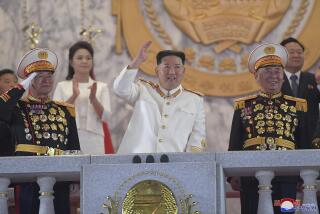Korean Liberation Day Marked With Fiery Riot
- Share via
SEOUL — South Korea on Wednesday celebrated the 45th anniversary of its liberation from Japanese colonization with a ritual of fiery student protest.
More than 10,000 demonstrators battled riot police at the gates of Yonsei University in western Seoul in a futile attempt to march to the border with North Korea for a Communist-sponsored reunification rally.
Policemen fired tear gas into the throng of students, who scattered and regrouped to respond with firebombs and rocks. The authorities not only blocked the student march but at the same time prevented a caravan of buses carrying dissidents from leaving the campus for the border.
A police spokesman said more than 100 people were injured and about 350 arrested in the two-hour confrontation, according to press reports.
Elsewhere, radical students hurling firebombs and shouting anti-American slogans attacked a U.S. Army facility near downtown Seoul, police said. But a spokesman for the U.S. 8th Army said there were no injuries and no significant damage.
Violent protest on Liberation Day has become a tradition in recent years. Aug. 15 is not only the date when Japan surrendered to the Allies at the end of World War II but also the beginning of the Korean peninsula’s division into Soviet and U.S. spheres of influence.
For the past three years, South Korean students have tried to march to the border truce village of Panmunjom for rallies with their counterparts from North Korea. This year, public expectations were running especially high after South Korean President Roh Tae Woo declared his intention to open the border to free travel between the two Koreas. But the Seoul government scrapped the plan after both sides raised procedural obstacles to the exchange of visitors.
North Korea had a rally Wednesday on its side of the demarcation line in Panmunjom, but without the South Korean delegates it had invited.
South Korea had its rally in Imjingak, just south of the border. It was attended by an estimated 2,000 people separated from relatives in the north. Pro-government demonstrators accused North Korea of foiling the border opening. Like the dissidents, they were blocked from entering Panmunjom by South Korean police.
More to Read
Sign up for Essential California
The most important California stories and recommendations in your inbox every morning.
You may occasionally receive promotional content from the Los Angeles Times.













